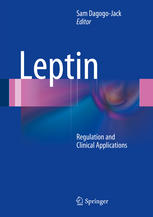

Most ebook files are in PDF format, so you can easily read them using various software such as Foxit Reader or directly on the Google Chrome browser.
Some ebook files are released by publishers in other formats such as .awz, .mobi, .epub, .fb2, etc. You may need to install specific software to read these formats on mobile/PC, such as Calibre.
Please read the tutorial at this link: https://ebookbell.com/faq
We offer FREE conversion to the popular formats you request; however, this may take some time. Therefore, right after payment, please email us, and we will try to provide the service as quickly as possible.
For some exceptional file formats or broken links (if any), please refrain from opening any disputes. Instead, email us first, and we will try to assist within a maximum of 6 hours.
EbookBell Team

0.0
0 reviewsTwenty years after its discovery, recombinant human leptin has been approved by the Food and Drug Administration for the treatment of patients with lipodystrophy. Beginning with a synthesis of the vast body of work on its discovery, dissection of mechanisms, and effects in experimental models , the focus of this book shifts to a consideration of the regulation and role of leptin in humans. The emphasis on human-level data is a unique feature of this book. The results of numerous studies indicate that leptin is indeed a regulated human hormone.
Leptin provides a detailed account of the myriad physiological, hormonal, metabolic, immunological, mitogenic and inflammatory modulators and targets of leptin in a single volume. Next follows a comprehensive presentation of the therapeutic trials of recombinant leptin in patients with congenital leptin deficiency, lipodystrophy, hypothalamic amenorrhea, and other emerging areas, including leptin supplementation in leptin-replete subjects, leptin substitution for insulin in diabetic models, and novel combination regimens of leptin and other biogenic peptides. Unanswered questions and future directions in leptin research are highlighted in the Foreword by Dr. Jeffrey Friedman and throughout the volume. Identifying such questions helps direct research that could deepen understanding of the complex regulation of leptin under physiological and pathological conditions, a critical prerequisite to its rational deployment in the treatment of human disorders.